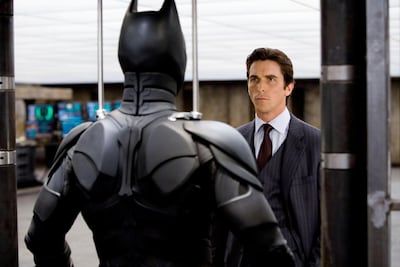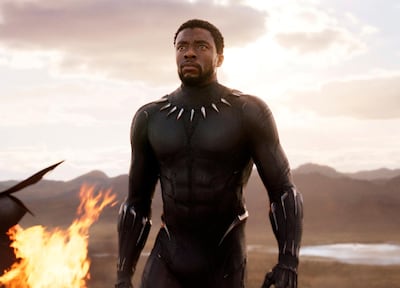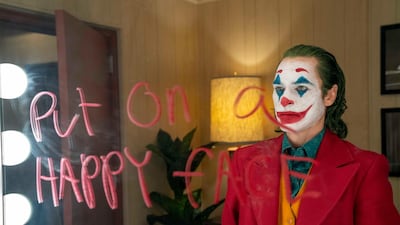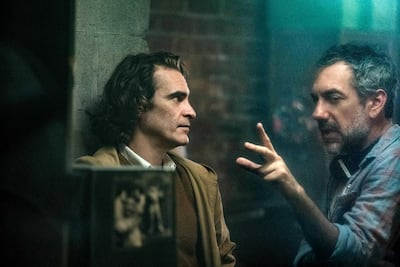Ever since its premiere at the Venice Film Festival at the end of August, Joker has dominated cultural conversations across the world. At first, these discussions were focused on the impressive reviews the film received. Then people began to talk about whether it was in the running for an Oscar. But lately the focus has been on the impact Joker's controversial content might have on audiences.
No other comic book movie has been greeted with such frenzied debate and discussion from such a wide variety of critics and commentators. And with early estimates suggesting Joker would make more than $100 million (Dh367.3m) at the box office in its opening weekend, despite only costing about $55m to make, there's a good chance it will encourage other filmmakers to make comic book movies that are similarly bold, grounded, original and risky.
That would likely be a huge relief for anyone left disappointed by recent films featuring comic book characters such as the Fantastic Four, Hellboy, X-Men, Superman and Batman, which have been criticised for feeling like pale imitations of the popular productions from the Marvel Cinematic Universe.
Why is 'Joker' so unique?
But what is it that makes Joker, which stars Joaquin Phoenix, feel so unique?
Production designer Mark Feinberg spotted its originality as soon as he read director Todd Phillips's script. It took a while, though, for Feinberg to actually sit down and look at it. He was so disinterested in working in the comic book genre again, having done so on 2014 film The Amazing Spider-Man 2, that he turned down Phillips's repeated invitations to join his crew. "I prejudged it," says Feinberg, who became hooked by the way Phillips and co-writer Scott Silver had figured out how to make a comic book movie that wasn't about "escaping our world" but "confronting it".
While Feinberg and costume designer Mark Bridges were attracted to the uniqueness of Joker, they say no one on set discussed the ways in which the film would be different to others from the genre. "We didn't talk about what we weren't doing," says Feinberg. "We talked about the cinema that inspired us."
For Feinberg, this meant focusing on movies by Martin Scorsese, especially as the director's hits Taxi Driver and The King of Comedy were major influences on Phillips. Bridges says he studied the work of New York photographers from the 1980s who were able to "capture loneliness in a crowd" in their pictures.
Joker isn’t the first comic-book movie to be so serious
All of these influences combine to give Joker a depth, seriousness and pathos that means it has more in common with the American New Wave movement of the 1970s, during which filmmakers such as Steven Spielberg, George Lucas, Francis Ford Coppola and Scorsese burst on to the cinematic scene, than the modern blockbuster.
But Joker isn't the first comic book movie to approach its subject matter in such a dark, serious and thought-provoking manner. Christopher Nolan's Dark Knight trilogy, which consisted of Batman Begins, The Dark Knight and The Dark Knight Rises, was hugely successful with this approach, as was 2017's Logan, in which director James Mangold oversaw Hugh Jackman's emotional farewell as X-Men character Wolverine.
For Sean O'Connell, managing director of entertainment news outlet CinemaBlend and co-host of the ReelBlend podcast, these movies worked because they treated their "mature source material with respect", as Nolan, Mangold and Phillips didn't "cut corners to water down their subject matter".
The fact the comic book movies have never been as popular means that there should be more and more opportunities for directors to do something different with the genre. Not only did Avengers: Endgame become the highest-grossing film of all time, but O'Connell says a superhero or comic book movie has been released almost every month this year.
With so many characters and sequels to explore, O'Connell says he hopes Joker will "empower studios to take more risks on projects that don't seem like safe, four-quadrant crowd-pleasers in the comic book realm". He also says that Joker stands out because it "isn't trying to set up another movie, or continue a story that was handed to it by a separate filmmaker". Instead, it is "a stand-alone story with a clear beginning and a distinct ending".
What’s the future for the genre?
Feinberg suggests there is unlikely to be a Joker sequel. "The one thing that really attracted me to Joker was that Todd wasn't interested in doing a franchise. He wanted to make a one-off," he explains. He also says that if Phillips and Warner Bros were to franchise anything from Joker it would be the "origin stories of how people get to the level of being two-dimensional or comic book characters".
That plan has been teased already by Phillips in an interview with Empire. The director has told Warner Bros that they should find "great filmmakers" to make comic book movies made on $30m budgets, with no CGI. He wants them to strip away everything that has defined the genre in the wake of Marvel's success. "Instead of trying to live in the shadow of the beast [the MCU], let's do something they can't," he says in the interview. "It'll be liberating."
Marvel isn't simply basking in its triumphs, though. After the success of Black Panther and Captain Marvel, the studio is looking to introduce more diverse characters into the MCU, while The Eternals, Shang-Chi and the Legend of the Ten Rings and Doctor Strange in the Multiverse of Madness all promise to be even more visually arresting, surreal and cosmic than the 23 previous instalments to the cinematic behemoth. Disney's acquisition of 20th Century Fox also means that it has the small matter of bringing Blade, the Fantastic Four and the X-Men into the fold.
After dominating the box office for the best part of 20 years, the comic book genre still shows absolutely no signs of slowing down. Instead, it looks as though it is about to begin a new chapter, one that doesn't only have the potential to take the films to new artistic heights, but had might even please cinema-goers who have previously dismissed these films.
Essentials
The flights: You can fly from the UAE to Iceland with one stop in Europe with a variety of airlines. Return flights with Emirates from Dubai to Stockholm, then Icelandair to Reykjavik, cost from Dh4,153 return. The whole trip takes 11 hours. British Airways flies from Abu Dhabi and Dubai to Reykjavik, via London, with return flights taking 12 hours and costing from Dh2,490 return, including taxes.
The activities: A half-day Silfra snorkelling trip costs 14,990 Icelandic kronur (Dh544) with Dive.is. Inside the Volcano also takes half a day and costs 42,000 kronur (Dh1,524). The Jokulsarlon small-boat cruise lasts about an hour and costs 9,800 kronur (Dh356). Into the Glacier costs 19,500 kronur (Dh708). It lasts three to four hours.
The tours: It’s often better to book a tailor-made trip through a specialist operator. UK-based Discover the World offers seven nights, self-driving, across the island from £892 (Dh4,505) per person. This includes three nights’ accommodation at Hotel Husafell near Into the Glacier, two nights at Hotel Ranga and two nights at the Icelandair Hotel Klaustur. It includes car rental, plus an iPad with itinerary and tourist information pre-loaded onto it, while activities can be booked as optional extras. More information inspiredbyiceland.com
MATCH INFO
Delhi Daredevils 174-4 (20 ovs)
Mumbai Indians 163 (19.3 ovs)
Delhi won the match by 11 runs
THE SPECS
2020 Toyota Corolla Hybrid LE
Engine: 1.8 litre combined with 16-volt electric motors
Transmission: Automatic with manual shifting mode
Power: 121hp
Torque: 142Nm
Price: Dh95,900
Zidane's managerial achievements
La Liga: 2016/17
Spanish Super Cup: 2017
Uefa Champions League: 2015/16, 2016/17, 2017/18
Uefa Super Cup: 2016, 2017
Fifa Club World Cup: 2016, 2017
more from Janine di Giovanni
COMPANY PROFILE
Name: Mamo Year it started: 2019 Founders: Imad Gharazeddine, Asim Janjua Based: Dubai, UAE Number of employees: 28 Sector: Financial services Investment: $9.5m Funding stage: Pre-Series A Investors: Global Ventures, GFC, 4DX Ventures, AlRajhi Partners, Olive Tree Capital, and prominent Silicon Valley investors. The Settlers
Director: Louis Theroux
Starring: Daniella Weiss, Ari Abramowitz
Rating: 5/5
Read more about the coronavirus
Yahya Al Ghassani's bio
Date of birth: April 18, 1998
Playing position: Winger
Clubs: 2015-2017 – Al Ahli Dubai; March-June 2018 – Paris FC; August – Al Wahda
ICC Women's T20 World Cup Asia Qualifier 2025, Thailand
UAE fixtures
May 9, v Malaysia
May 10, v Qatar
May 13, v Malaysia
May 15, v Qatar
May 18 and 19, semi-finals
May 20, final
WOMAN AND CHILD
Director: Saeed Roustaee
Starring: Parinaz Izadyar, Payman Maadi
Rating: 4/5
Sole survivors
- Cecelia Crocker was on board Northwest Airlines Flight 255 in 1987 when it crashed in Detroit, killing 154 people, including her parents and brother. The plane had hit a light pole on take off
- George Lamson Jr, from Minnesota, was on a Galaxy Airlines flight that crashed in Reno in 1985, killing 68 people. His entire seat was launched out of the plane
- Bahia Bakari, then 12, survived when a Yemenia Airways flight crashed near the Comoros in 2009, killing 152. She was found clinging to wreckage after floating in the ocean for 13 hours.
- Jim Polehinke was the co-pilot and sole survivor of a 2006 Comair flight that crashed in Lexington, Kentucky, killing 49.
UAE rugby season
FIXTURES
West Asia Premiership
Dubai Hurricanes v Dubai Knights Eagles
Dubai Tigers v Bahrain
Jebel Ali Dragons v Abu Dhabi Harlequins
UAE Division 1
Dubai Sharks v Dubai Hurricanes II
Al Ain Amblers v Dubai Knights Eagles II
Dubai Tigers II v Abu Dhabi Saracens
Jebel Ali Dragons II v Abu Dhabi Harlequins II
Sharjah Wanderers v Dubai Exiles II
LAST SEASON
West Asia Premiership
Winners – Bahrain
Runners-up – Dubai Exiles
UAE Premiership
Winners – Abu Dhabi Harlequins
Runners-up – Jebel Ali Dragons
Dubai Rugby Sevens
Winners – Dubai Hurricanes
Runners-up – Abu Dhabi Harlequins
UAE Conference
Winners – Dubai Tigers
Runners-up – Al Ain Amblers
UAE currency: the story behind the money in your pockets
TRAP
Starring: Josh Hartnett, Saleka Shyamalan, Ariel Donaghue
Director: M Night Shyamalan
Rating: 3/5
THE SPECS
Engine: 3-litre V6
Transmission: eight-speed automatic
Power: 424hp
Torque: 580 Nm
Price: From Dh399,000
On sale: Now
Specs
Engine: 51.5kW electric motor
Range: 400km
Power: 134bhp
Torque: 175Nm
Price: From Dh98,800
Available: Now
GAC GS8 Specs
Engine: 2.0-litre 4cyl turbo
Power: 248hp at 5,200rpm
Torque: 400Nm at 1,750-4,000rpm
Transmission: 8-speed auto
Fuel consumption: 9.1L/100km
On sale: Now
Price: From Dh149,900
Where to submit a sample
Volunteers of all ages can submit DNA samples at centres across Abu Dhabi, including: Abu Dhabi National Exhibition Centre (Adnec), Biogenix Labs in Masdar City, NMC Royal Hospital in Khalifa City, NMC Royal Medical Centre, Abu Dhabi, NMC Royal Women's Hospital, Bareen International Hospital, Al Towayya in Al Ain, NMC Specialty Hospital, Al Ain
Dust and sand storms compared
Sand storm
- Particle size: Larger, heavier sand grains
- Visibility: Often dramatic with thick "walls" of sand
- Duration: Short-lived, typically localised
- Travel distance: Limited
- Source: Open desert areas with strong winds
Dust storm
- Particle size: Much finer, lightweight particles
- Visibility: Hazy skies but less intense
- Duration: Can linger for days
- Travel distance: Long-range, up to thousands of kilometres
- Source: Can be carried from distant regions
The years Ramadan fell in May
APPLE IPAD MINI (A17 PRO)
Display: 21cm Liquid Retina Display, 2266 x 1488, 326ppi, 500 nits
Chip: Apple A17 Pro, 6-core CPU, 5-core GPU, 16-core Neural Engine
Storage: 128/256/512GB
Main camera: 12MP wide, f/1.8, digital zoom up to 5x, Smart HDR 4
Front camera: 12MP ultra-wide, f/2.4, Smart HDR 4, full-HD @ 25/30/60fps
Biometrics: Touch ID, Face ID
Colours: Blue, purple, space grey, starlight
In the box: iPad mini, USB-C cable, 20W USB-C power adapter
Price: From Dh2,099
Killing of Qassem Suleimani
Off-roading in the UAE: How to checklist
COMPANY PROFILE
Name: Kumulus Water
Started: 2021
Founders: Iheb Triki and Mohamed Ali Abid
Based: Tunisia
Sector: Water technology
Number of staff: 22
Investment raised: $4 million
Results:
5pm: Handicap (PA) | Dh80,000 | 1,600 metres
Winner: Dasan Da, Saeed Al Mazrooei (jockey), Helal Al Alawi (trainer)
5.30pm: Maiden (PA) | Dh80,000 | 1,600m
Winner: AF Saabah, Tadhg O’Shea, Ernst Oertel
6pm: Handicap (PA) | Dh80,000 | 1,600m
Winner: Mukaram, Pat Cosgrave, Eric Lemartinel
6.30pm: Handicap (PA) | Dh80,000 | 2,200m
Winner: MH Tawag, Richard Mullen, Elise Jeanne
7pm: Wathba Stallions Cup Handicap (PA) | Dh70,000 | 1,400m
Winner: RB Inferno, Fabrice Veron, Ismail Mohammed
7.30pm: Handicap (TB) | Dh100,000 | 1,600m
Winner: Juthoor, Jim Crowley, Erwan Charpy
COMPANY%20PROFILE
%3Cp%3E%3Cstrong%3ECompany%20name%3A%3C%2Fstrong%3E%20Alaan%3Cbr%3E%3Cstrong%3EStarted%3A%3C%2Fstrong%3E%202021%3Cbr%3E%3Cstrong%3EBased%3A%3C%2Fstrong%3E%20Dubai%3Cbr%3E%3Cstrong%3EFounders%3A%3C%2Fstrong%3E%20Parthi%20Duraisamy%20and%20Karun%20Kurien%3Cbr%3E%3Cstrong%3ESector%3A%3C%2Fstrong%3E%20FinTech%3Cbr%3E%3Cstrong%3EInvestment%20stage%3A%3C%2Fstrong%3E%20%247%20million%20raised%20in%20total%20%E2%80%94%20%242.5%20million%20in%20a%20seed%20round%20and%20%244.5%20million%20in%20a%20pre-series%20A%20round%3Cbr%3E%3Cbr%3E%3C%2Fp%3E%0A
What is graphene?
Graphene is extracted from graphite and is made up of pure carbon.
It is 200 times more resistant than steel and five times lighter than aluminum.
It conducts electricity better than any other material at room temperature.
It is thought that graphene could boost the useful life of batteries by 10 per cent.
Graphene can also detect cancer cells in the early stages of the disease.
The material was first discovered when Andre Geim and Konstantin Novoselov were 'playing' with graphite at the University of Manchester in 2004.
The five pillars of Islam
1. Fasting
2. Prayer
3. Hajj
4. Shahada
5. Zakat
RESULTS
5pm: Maiden (PA) Dh80,000 1,600m
Winner: Raghida, Szczepan Mazur (jockey), Ibrahim Al Hadhrami (trainer)
5.30pm: Maiden (PA) Dh80,000 1,600m
Winner: AF Alareeq, Connor Beasley, Ahmed Al Mehairbi
6pm: Arabian Triple Crown Round-2 Group 3 (PA) Dh300,000 2,200m
Winner: Basmah, Fabrice Veron, Eric Lemartinel
6.30pm: Liwa Oasis Group 2 (PA) Dh300,000 1,400m
Winner: AF Alwajel, Tadhg O’Shea, Ernst Oertel
7pm: Wathba Stallions Cup Handicap (PA) Dh70,000 1,600m
Winner: SS Jalmod, Richard Mullen, Satish Seemar
7.30pm: Handicap (TB) Dh100,000 1,600m
Winner: Trolius, Ryan Powell, Simon Crisford
How to donate
Send “thenational” to the following numbers or call the hotline on: 0502955999
2289 – Dh10
2252 – Dh 50
6025 – Dh20
6027 – Dh 100
6026 – Dh 200
PSA DUBAI WORLD SERIES FINALS LINE-UP
Men’s:
Mohamed El Shorbagy (EGY)
Ali Farag (EGY)
Simon Rosner (GER)
Tarek Momen (EGY)
Miguel Angel Rodriguez (COL)
Gregory Gaultier (FRA)
Karim Abdel Gawad (EGY)
Nick Matthew (ENG)
Women's:
Nour El Sherbini (EGY)
Raneem El Welily (EGY)
Nour El Tayeb (EGY)
Laura Massaro (ENG)
Joelle King (NZE)
Camille Serme (FRA)
Nouran Gohar (EGY)
Sarah-Jane Perry (ENG)




